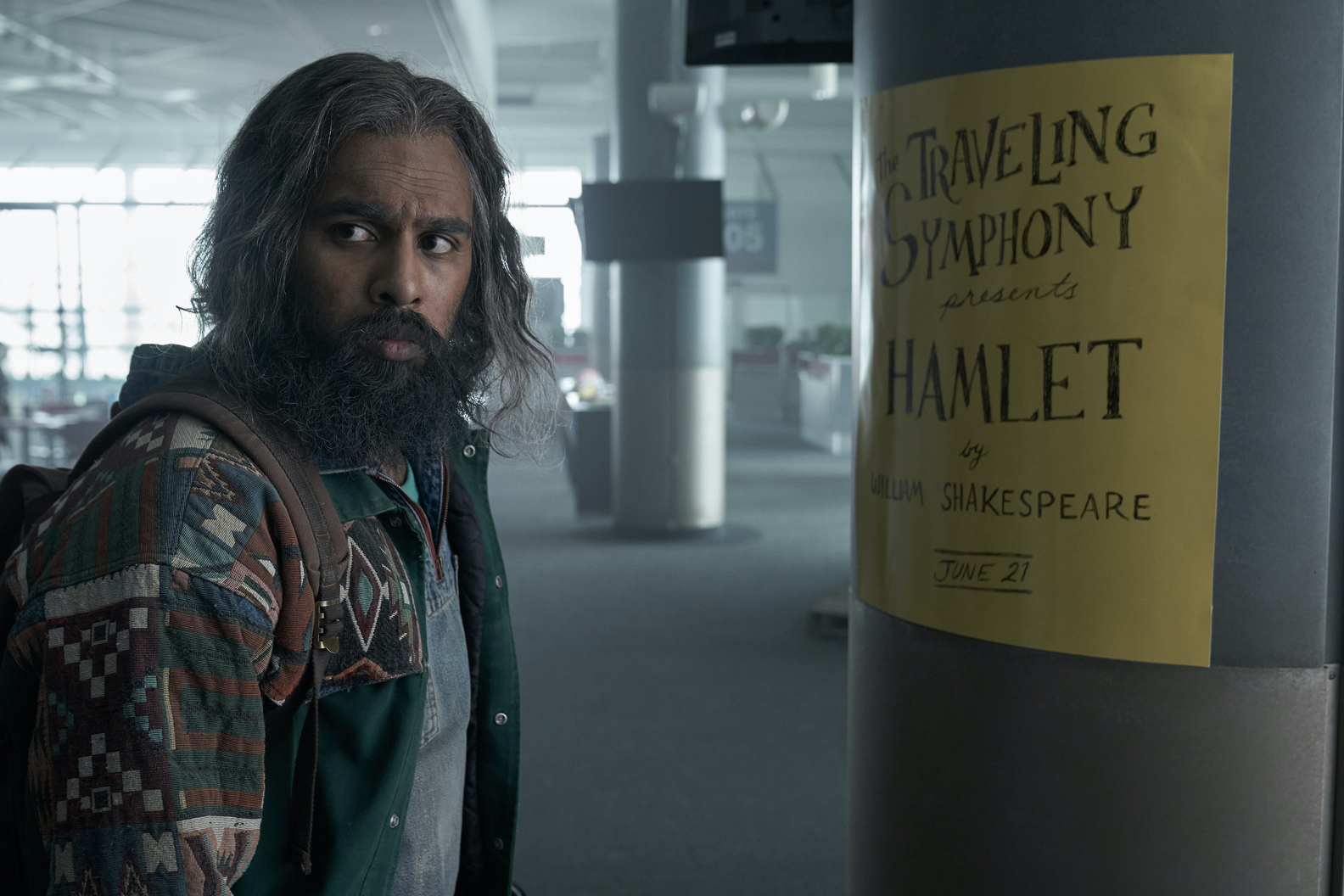I know it may be hard to watch a show about a pandemic right now, but HBO Max’s Station Eleven can help you start to process the trauma we are all currently experiencing. Everyone has lived a different version of these Coronavirus years, experiencing different stages of grief at different times with different triggers. Think denying it’s actually happening, angry that not everyone is doing their part, depressed from isolation and loss, bargaining to figure out how to navigate and justify our limits, and, of course, accepting living with it.
Based on the novel by Emily St. John Mandel, Station Eleven follows the aftermath of a global flu pandemic. From the day of the outbreak, to how a group is surviving by bringing humanity back to life through art, we follow a cast of characters with a shared connection. They call themselves the Traveling Symphony, a group of surviving musicians and actors that perform Shakespeare for new post-apocalyptic communities. A play within a play, this series is in the details. Even the costumes were amazing. In their own way, an exhibit for the ‘Museum of Civilization,’ an important treasure from this new world.

A Book-To-Series Adaptation
One of the best classes I took in college was on adaptations and what it meant to take a book and create something new with it. Whether you read Emily St. John Mandel’s beautiful novel or not, HBO Max’s limited series is an adaptation. Regardless of how you feel about them, I think adaptations are important because they keep art alive. It might not look exactly like how you imagined your reading experience of Station Eleven, and it shouldn’t. It’s someone’s vision of the work and creator and showrunner, Patrick Somerville, made something beautiful. You don’t need to read the book to watch this series, the beautiful thing about this adaptation is that it can stand on its own.
There are a few major changes between the book and the series but I think it actually worked really well. Somerville asks a lot of what-ifs: What if Kirsten and Jeevan bunker down and spend more time together? What if Arthur had a bigger storyline? What if Miranda’s comic book comes to life? Each question expands the world further than we could have imagined.
Kicking off the first episode with one of the greats (and one of my favorites) is Gael García Bernal as Arthur, an actor who dies on stage amid his performance of King Lear on the first night of the pandemic. I thought Bernal was perfect for this mysterious side character. He really brought a piece of this story to life, helping make Arthur a more central role in the series.
Having Kirsten and Jeevan’s paths merge into more than just a one-off meeting at the beginning also made these characters stronger. Both Mackenzie Davis (Kirsten) and Himesh Patel (Jeevan) did an amazing job with these complicated, traumatized characters; even young Kirsten, played by Matilda Lawler, deserved a standing ovation. The anticipation of having Kirsten reunite with Jeevan in the last episode had me at the edge of my seat. I was immediately brought to tears after being teased about whether or not it would actually happen. Did it? You’ll have to see for yourself.

Healing Trauma Through Art
The way this show displays how we can heal will have you wanting to spend time with your inner child. Starting at a young age, Kirsten uses the power of drama to heal relationships. From an ironic and specific way for two brothers to say their final goodbyes, to a scene from Hamlet that helps rekindle and forgive the mistakes a mother makes to protect her son, there’s something cathartic about the power of dramatized works. The theater is all Kirsten’s ever known and the show uses it so beautifully as a way to heal the ongoing trauma everyone continues to experience within the pandemic.
One of my favorite scenes is in episode seven, ‘Goodbye My Damaged Home.’ While lying unconscious, Kirsten’s mind goes back to the apartment with Frank and Jeevan. She follows a younger version of herself, trying to protect her from what’s about to happen. Adult Kirsten and young Kirsten are very much alike, their emotional maturity and traumatic experiences align. Reminding us that past versions of ourselves are still accessible, ready to help us heal.

What Will You Create?
In the last episode, when Arthur asks Miranda: “how does it feel to actually accomplish something?” I think about all the things we have tried to accomplish during this pandemic. For me personally, it was finishing a novel (another reason this show really spoke to me.) Living with an autoimmune disease has made this pandemic very isolating for me. The word that keeps coming to me when I ask myself how I feel is abandoned. Station Eleven was the work of art I needed in year three of this new world we’re living in.
Sometimes I forget I’m just trying to survive right now. That I’m doing my best. Like the members of the Traveling Symphony, I too have turned to art as a way to heal, a way to begin to unravel the twisted ball of pain/worry/fear that continues to tangle itself with every new wave of COVID-19. If art is the way I start to make sense of this new pandemic trauma, then art is what I’ll continue to do. The thing that keeps me going is knowing that I still have a job to do (very Miranda, I know). There’s still art to share, stories to write. There’s still time. Let’s not be afraid to examine even our recent wounds and ask questions.
Station Eleven is available to stream on HBO Max.

